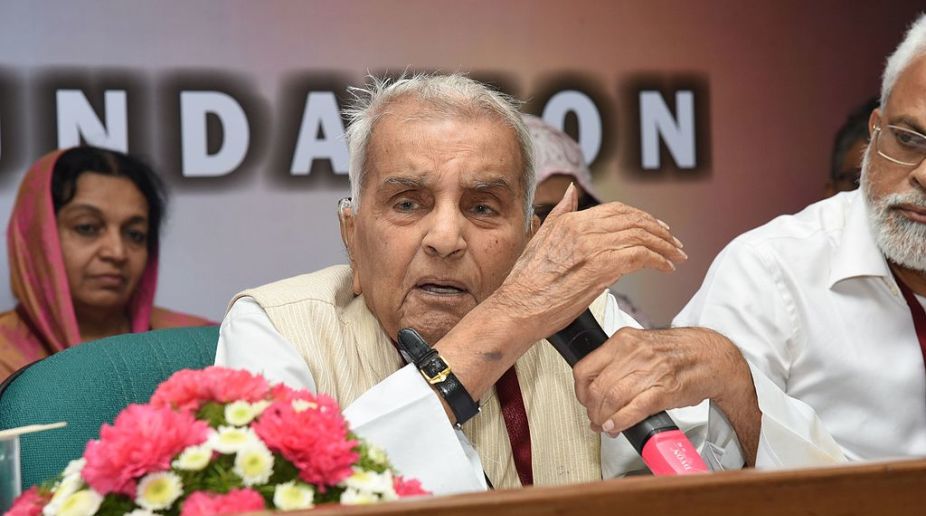“What is happening to Muslims in India today, happened to Dalits in 1980s”: Rahul Gandhi in San Francisco
Rahul Gandhi said, "what is happening to Muslims in India today, happened to Dalits in the 1980s" and it has "to be fought with affection".
Justice Sachar was Chief Justice of the Delhi high Court from 6 August 1985 to 22 December 1985. He started his career in the field of law from Shimla on 22 April 1952 and by 1960 was practicing in the Supreme Court.

(Photo: Wikimedia Commons)
On Friday, the 20th of April 2018, former Delhi High Court Chief Justice Rajinder Singh Sachar passed away. He was one of India’s most respected (or reviled, based on one’s political position) members of the judiciary. Though he was 94, Justice Sachar continued to act as a guiding light to many who fought for human rights.
Justice Sachar was Chief Justice of the Delhi high Court from 6 August 1985 to 22 December 1985. He started his career in the field of law from Shimla on 22 April 1952 and by 1960 was practicing in the Supreme Court.
Advertisement
Throughout his stellar career, Justice Sachar presided over, argued over, or chaired committees over a series of important cases or issues. Of note were the review of the Companies Act, the Monopolies and Restrictive Trade Practices Act, and the Industrial Disputes Act.
Advertisement
In 1984, a very important case was presented before the court of Justice Sachar. It was a writ petition filed before the court by People’s Union of Democratic Rights (PUDR) of which noted human rights lawyer Nandita Haksar was a part. The petition requested the court to order the Police to file FIRs against leaders named in affidavits of victims of the 1984 anti-Sikh riots.
But the case was removed from Justice Sachar’s court and transferred to two other judges who dismissed the petition in “national interest”.
In November 2012, Justice Sachar was among those who presented a memorandum to the then prime minister Manmohan Singh on behalf of the families of the victims of the 1984 riots. They were demanding justice.
At the Justice/Insaaf 84 Conclave organised by Amnesty International India at the India Habitat Centre on 23 June 2016, Justice Sachar commented on the 1984 riots in the following words: “Where we (the judiciary) have failed is at the top.”
A fighter for civil liberties and rights of the people, Justice Sachar continued to champion the causes he stood for. Between 1990 and 2003, Justice Sachar had demanded the abolition of POTA (which was done) and fought for the housing rights of slum dwellers.
The Sachar Committee Report
Justice Sachar is best known for the report named after him.
The Sachar Committee report documented the state of Muslims in India. Commissioned by the then PM Manmohan Singh in 2005 and submitted in 2006, the ‘Report on Social, Economic and Educational Status of the Muslim Community of India’ is considered a landmark report that assesses on the ground level the lives of the minority community, their problems and the perception of the community in the eyes of others.
The seven member Committee led by Justice Sachar had in it Saiyid Hamid, Dr TK Oommen, MA Basith, Dr Rakesh Basant, Dr Akhtar Majeed, and Dr Abusaleh Shariff.
The 403-page report revealed that 25 per cent of Muslim children in the 6-14 year age group have either never attended school or have dropped out. In premier colleges only one out of 25 under-graduate students and one out of 50 post-graduate students is a Muslim.
The startling report also highlighted that Muslims are among the least represented in government jobs.
According to the report, only 3 per cent were in IAS, 1.8 per cent in the IFS and 4 per cent in the IPS – the three highest categories of civil service in India. Besides, Muslims constituted only 4.5 per cent in Indian Railways – the largest government employer in the country – and 98.7 per cent of those were at lower levels.
There was not a single state in 13 most Muslim populous states visited by the team where the representation of Muslims in the government departments matched their population share. The Committee found that among all socio-religious communities, unemployment rate among Muslim graduates was the highest.
The Committee recommended an Equal Opportunity Commission to address the grievances of the community. Besides that, the Committee also recommended that all socio-religious communities should be given equal opportunity in the fields of education, governance, private employment and housing.
Justice Sachar Committee recommended that the state should find ways to link Madarsas and mainstream school boards to enable students studying in Madarsas shift to a regular mainstream education.
The report stirred a hornet’s nest in the country with the Bharatiya Janata Party (BJP) alleging that the Committee was created with the intent to manipulate the electorate and influence elections.
Advertisement